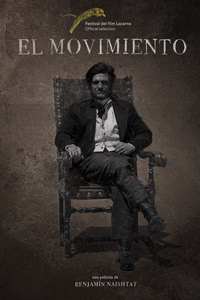Reviews
El Movimiento | Review
Birth of No Nation: Naishtat’s Compelling, Experimental History Lesson
 Argentinean director Benjamin Naishtat’s sophomore effort, El Movimiento is a disturbing and inventive account of national identity born out of anarchy. Budgetary restraints led to ambitious utilization of resources with a piece of cinema as striking to behold with its gloomy black and white cinematography as its subject matter is vile. The stagey depiction of ex-soldiers turned bandits desperate to gain control of a region divided by considerable conflicts veers from amusingly shoddy to utterly vicious, often within the same, clipped sequence. Austere in a way recalling the icy fatality of Haneke, while evocative moments of violence are comparable to Reygadas, Naishtat’s film remains disconcerting throughout, aided by abrupt editing jolts and a superb menacing score from Pedro Irusta.
Argentinean director Benjamin Naishtat’s sophomore effort, El Movimiento is a disturbing and inventive account of national identity born out of anarchy. Budgetary restraints led to ambitious utilization of resources with a piece of cinema as striking to behold with its gloomy black and white cinematography as its subject matter is vile. The stagey depiction of ex-soldiers turned bandits desperate to gain control of a region divided by considerable conflicts veers from amusingly shoddy to utterly vicious, often within the same, clipped sequence. Austere in a way recalling the icy fatality of Haneke, while evocative moments of violence are comparable to Reygadas, Naishtat’s film remains disconcerting throughout, aided by abrupt editing jolts and a superb menacing score from Pedro Irusta.
Set in 1835 Argentina, Naishtat opens with three words: Argentina, Anarchy, Plague. A band of former soldiers execute a poor farmer selling pastries, one of many despicable atrocities occurring on the desolate frontier thanks to the rampant fighting between disparate groups. A central figure emerges, Senor (Pablo Cedron), a well-spoken leader of a slowly growing faction of followers who claims to be organizing a new political group known as ‘the movement.’ He labors to gather attendees at his first upcoming speech, aiming to unite the divided country and defeat the onslaught of anarchy.
Premiering out of Locarno, Naishtat’s latest, following his 2014 debut History of Fear, aims to examine an inherently violent period from which a national identity would soon be born. Images float out of shimmering darkness like organisms grasping to take hold and dominate the frame, and Naishtat’s budgetary constraints, while conveying an unavoidable sense of artificiality, only aids the film’s parabolic tone. Naishtat stacks his most violent moments in the first two sequences of the film, whereby a farmer’s head is cruelly blown off via a canon by a troupe of bitter ex-military members, followed with the murder of another farmer by Senor’s henchman. These moments establish a sense of irony concerning a later monologue from Senor, vocalizing the horrible, savage things he’s witnessed.
The rallying of beleaguered citizens so Senor can reveal his grand plans for ‘the movement’ culminates in more vague rhetoric, but only proves the importance of how one says something rather than what’s actually being said. Performances sometimes seem as aimless as they are wooden, which doesn’t seem out of place in Naishtat’s surreal snapshot. Faces often loom in close-up, frontiers folk we assume doomed thanks to a score which promises an outbreak of horror at any moment.
Editor Andres Quaranta does an impeccable job of maintaining a queasy transition between moments potentially banal but unpredictable thanks to the extreme menace established by the film’s opening (assisted in part by the film’s notable square aspect ratio, which amplifies a boxed in feeling despite the sprawling landscape). The expressive black and white cinematography paired with unseemly historical depictions also recalls Radu Jude’s 2015 title Aferim!, concerning the once sanctioned abuse of Romania’s gypsy population.
DP Yarara Rodriguez makes an impressive debut here considering all the night time sequences utilizing only natural lighting. Dusty, desperate and its reimagining of Argentina’s frontier uncomfortably savage, El Movimiento is expertly made nihilistic arthouse cinema.
Reviewed on January 7 at the 2015 at the Film Society of Lincoln Center’s Neighboring Scenes: New Latin American Cinema – 70 mins.
★★★½/☆☆☆☆☆
Los Angeles based Nicholas Bell is IONCINEMA.com's Chief Film Critic and covers film festivals such as Sundance, Berlin, Cannes and TIFF. He is part of the critic groups on Rotten Tomatoes, The Los Angeles Film Critics Association (LAFCA), the Online Film Critics Society (OFCS) and GALECA. His top 3 for 2021: France (Bruno Dumont), Passing (Rebecca Hall) and Nightmare Alley (Guillermo Del Toro). He was a jury member at the 2019 Cleveland International Film Festival.

























